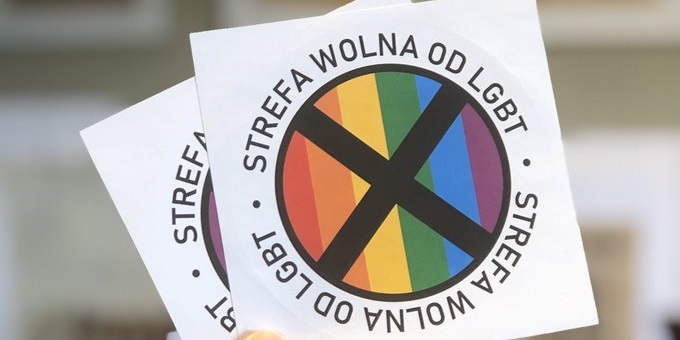Comment | Poland’s ‘LGBT-free zones’ show we have not learnt from history
The 'LGBT-free zones' sound too close to the Nazis' Judenfrei - free of Jews
By Steve Brown

Words: Hugh Kaye
A Spanish philosopher once said something along the lines of those who fail to learn from history are doomed to repeat it.
Writing in the Independent and The Washington Post last month, Rick Noack reported a highly disturbing incident in Kielce in Poland.
As queer activists staged the city’s first LGBTQ rights march, they were met by protestors brandishing banners comparing gay people to paedophiles. Others made threatening gestures, he wrote.
What makes this so disturbing is Kielce’s not-so-distant past. This was the place where, in July 1946, 42 Jews were murdered in a pogrom. Some were shot, others were bayoneted or clubbed to death with iron rods.
July 1946: the war in Europe had only been over slightly more than a year and the revelations about the Holocaust – Hitler’s plan to murder every Jew in Europe – were still fresh in people’s minds. Or, at least, they should have been.
The “excuse” for the pogrom was the centuries-old myth of Jews kidnapping children and using their blood for religious rituals. A Christian child had – incorrectly – been reported missing and a Jewish man was blamed.
The story was passed from resident to resident, each time getting more elaborate: children had been found dead, a boy had been nailed to the inside of a barrel.
Violence quickly escalated.
Decades later, the boy admitted that he had never been abducted. But even now some Poles blame the occupying Russians for the killings.
So, just strike out the word “Jew” and replace it with “gay man,” and we are where we are today. The ruling national-conservative (read Far Right) Law and Justice party have been linked with a movement to marginalise Poland’s LGBTQ community.
Noack points out that when Warsaw’s mayor Rafal Trzaskowski tried to integrate LGBTQ issues into the school curriculum, Law and Justice leader Jaroslaw Kaczynski described the idea as an attack on the family and on children, adding that “LGBTQ ideology” was a threat to the nation’s existence.
In some regions, party officials, claiming gay activists were forcing their views on heterosexual people, declared certain cities to be “LGBTQ-ideology free”.
There is no suggestion of homosexuality being criminalised in Poland.
Gay men are allowed to donate blood, there is an equal age of consent (15), gays can serve openly in the armed forces and, if certain requirements are met, people can legally change their gender. Discrimination in the work place, based on sexual orientation, is banned.
But same-sex marriage has been ruled to be against the country’s constitution and there is no protection against hate crime and hate speech. “LGBTQ-ideology free” sounds too close to the Nazis’ Judenfrei – free of Jews – for comfort.
The managing director of the Campaign Against Homophobia, in Warsaw, Vyacheslav Melnyk, is quoted as saying: “The message is pretty straightforward, there is no place for LGBTQ people,”
You can hardly disagree when Elzbieta Kruk, who stood for the Law and Justice party at the recent European elections, said: “I think Poland will be a region free from LGBT.”
While it is wrong — and contrary to Polish law — to call the camps “Polish”, historians agree that the one of the reasons the extermination centres were sited where they were is the underlying anti-Semitism that prevailed in that part of eastern Europe. Belzec, Sobibor, Treblinka, Chelmno and Auschwitz Birkenau were all in Poland.
It’s believed that three million Polish Jews died in Hitler’s death camps. About 250 from Kielce survived the Holocaust and made their way back home. Only to find hate alive and well.
The 1946 pogrom led to large number of Holocaust survivors leaving from all around the country. In the coming years, the Jewish population fell from 240,000 to 90,000.
That hate now seems to be focused on LGBTQ people. Sadly, it’s not just politicians who are making these noises.
Reports say the Catholic Church is involved too. That would not be too surprising. The Vatican signed a concordat with Adolf Hitler less than six months after the dictator took power in Germany in 1933, and Pope Pius XII has been accused of being almost totally silent as the scale of the slaughter of Jews became known.
Today, the Church isn’t known as one of the greatest supporters of LGBTQ people.
Right-wing newspapers have gone along for the ride too, helping to push up what rights groups say is an ever-increasing rise in homophobic attacks in a country that does not think it needs to keep reliable records of such incidents.
Not long after the unpleasant scenes in Kielce, protestors tried to curtail an LGBTQ parade in the eastern city of Bialystok – the scene of more German atrocities.
In 1941, the city’s Jews were rounded up and put in a ghetto; three families to one room living on 300g of bread each per day.
By 1943, 50,000 had been transported to their deaths in the gas chambers of Treblinka. Just a few hundred survived in other camps.
In present-day Poland. Kielce’s deputy president Danuta Papaj warned of socially excluded communities. That doesn’t sound very different to ghettos.
MEP Robert Biedron, the gay founder of a new political party in Poland, Spring, says that it’s a very short trip from hate speech to hate crime, while psychologist Bogdan Bialek, perhaps mindful of that quote about forgotten history, has worked tirelessly to keep the memory of Kielce’s past in people’s minds.
A Catholic, he is quoted as saying the Law and Justice party won past elections by stirring up fears surrounding immigrants but claims that the targeting of gay people could be even more dangerous.
Suddenly, that quote has an even more ominous ring to it. It would be nice to think that Poland’s right wingers take heed – hopefully before gay men start to die…
